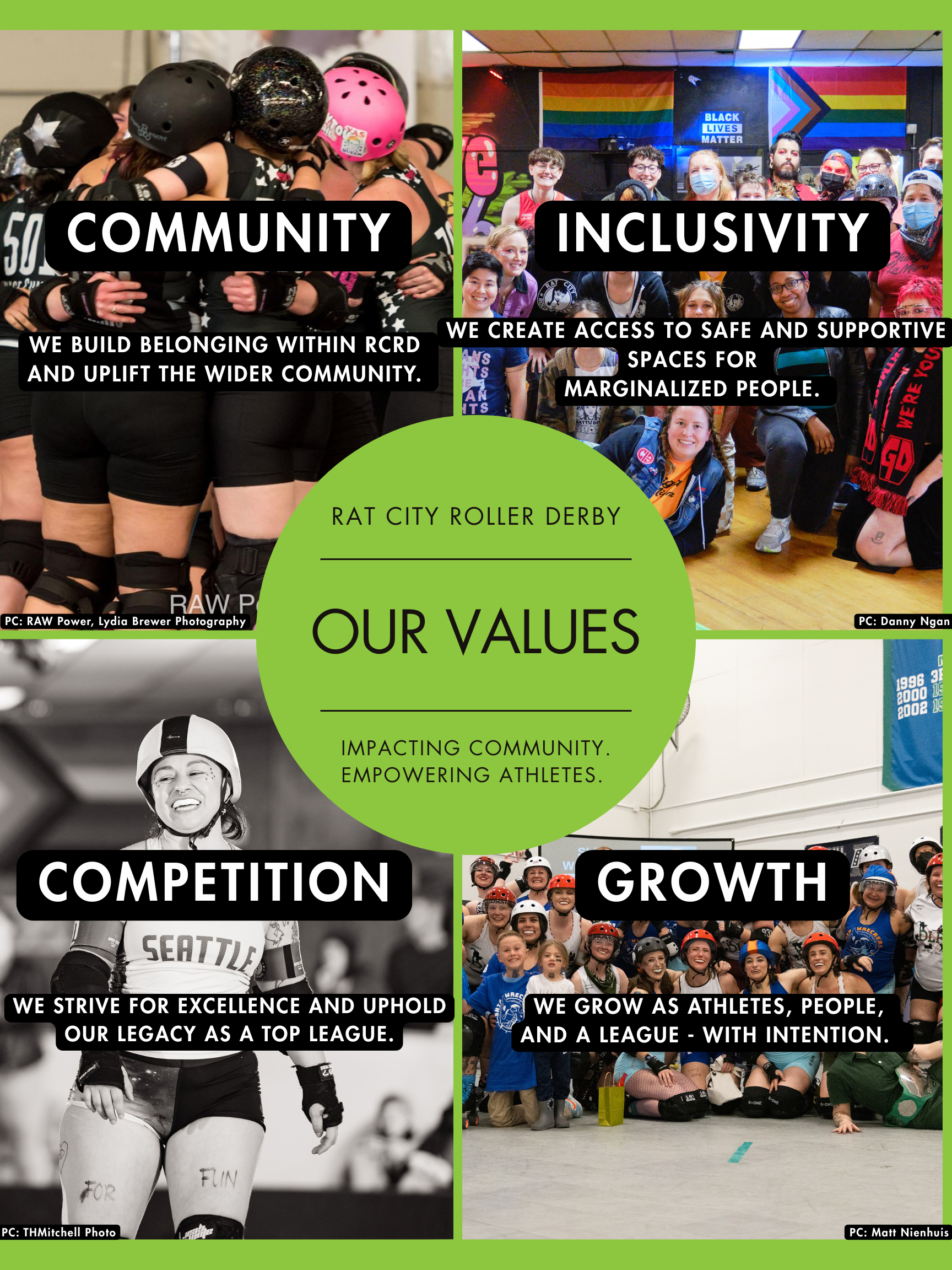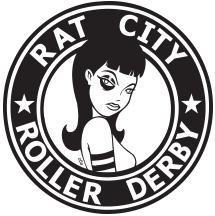Rat City Roller Derby (RCRD) is Seattle’s premier flat-track roller derby league. RCRD was formed in 2004 and has grown into a league of ~120 active members, with hundreds more retired and alumni skaters. We provide skating opportunities and training for skaters 18+, from beginner level through our All-Star team which is currently in the top 20 teams in the WFTDA. We have three home teams – Derby Liberation Front, Grave Danger, and Throttle Rockets (Sockit Wenches was retired in 2022)– as well as a recreational team, Mischief. Those new to roller skating can join our Pinkies Program, and then graduate to our development programs Rat Lab and Maul Rats. Our skaters are active in the Seattle derby community, with many coaching juniors ages 8-18.
Roller derby is one of the fastest growing sports in the world, and is a symbol of empowerment and diversity. At RCRD, we are proud to grow and represent the sport in Seattle and beyond. In the fall of 2017 we changed our name from Rat City Rollergirls to Rat City Roller Derby. We rebranded to create a more inclusive and empowering environment for skaters and fans.

Mission Statement
As Seattle’s premier, member-owned roller derby league, it is our mission to maintain a competitive athletic program, promote the sport of roller derby, provide quality sports entertainment for our fans, and make a positive impact in our community.
A Brief History
Rat City Roller Derby got rolling in April 2004, as Rat City Rollergirls. Our name was inspired by the nickname for the south Seattle neighborhood of White Center, “Rat City”, where RCRD started playing at the Southgate Roller Rink.
Within months Rat City Rollergirls had grown to four teams and 80-plus skater-members. Our skaters also formed one of the sport’s first all-star teams to represent Rat City on the national and international level.
Rat City values growing the local derby community, by hosting training camps; coaching junior derby; informally scrimmaging with teams from nearby leagues; and hosting tournaments like the first Bumberbout at Bumbershoot (2006), and WFTDA playoffs showcasing the best international teams in the sport.
In 2019 Rat City Roller Derby took the steps to fully transition to a non-profit organization. We are excited about the opportunity this gives us to more fully participate with other community organizations, while also being eligible for grants and monetary donations.
Land Acknowledgement
Rat City acknowledges that our events and training take place upon stolen Indigenous lands.
The Coast Salish are the Native Americans whose home is located along the shores of Puget Sound. There are more than 40 recognized and unrecognized tribes which include the Duwamish, Snoqualmie, Muckleshoot and Sammamish and they are the original caretakers for the continued protection of the land and waters with the preservation of the culture. We pay tribute to the Native people of this region and honor their knowledge and traditional culture.
We also acknowledge the robust Indigenous communities made up of tribal diversity that originate from around the country, and whose journeys have brought them here and to other locations by ways of forced displacement or seeking opportunities.
Today the same communities celebrate their heritage, showing resilience and tenacity that would be greatly admired by their ancestors.
If you would like to support the First Peoples of this land, one option is to support Real Rent Duwamish. You can learn more about whose land you live, work, and skate on here: https://native-land.ca/
Inspired by Se-ah-dom Edmo and Dr. Christine Dupres, Portland
What is a land acknowledgment statement?
A land acknowledgement is a formal statement – often presented at the beginning of public events and gatherings – that recognizes and honors Indigenous Peoples as traditional stewards of the land. Land acknowledgments offer a simple way of resisting the historic and ongoing attempted erasure of Indigenous histories and communities.
Why do we do this?
Chelsea Vowel, a Métis writer and educator from manitow-sâkahikan (Lac Ste. Anne) Alberta, residing in amiskwacîwâskahikan (Edmonton), offers an important interrogation of basic land acknowledgment practices:
“Often, territorial acknowledgments characterize non-Indigenous peoples as ‘guests’… Maybe now it is time to start learning about your obligations as a guest in this territory. What are the Indigenous protocols involved in being a guest, what are your responsibilities? What responsibilities do your hosts have towards you, and are you making space for those responsibilities to be exercised? To what extent are your events benefiting your hosts?… Moving beyond territorial acknowledgments means asking hard questions about what needs to be done once we’re ‘aware of Indigenous presence’. It requires that we remain uncomfortable, and it means making concrete, disruptive change. How can you be in good relationship with Indigenous peoples, with non-human beings, with the land and water?”
From ‘Beyond Territorial Acknowledgments, https://apihtawikosisan.com/2016/09/beyond-territorial-acknowledgments/
“Acknowledgment by itself is a small gesture. It becomes meaningful when coupled with authentic relationships and informed action. But this beginning can be an opening to greater public consciousness of Native sovereignty and cultural rights, a step toward equitable relationship and reconciliation.”…
“Acknowledgment is a simple, powerful way of showing respect and a step toward correcting the stories and practices that erase Indigenous people’s history and culture and toward inviting and honoring the truth.”
U.S. Department of Arts and Culture
“To recognize the land is an expression of gratitude and appreciation to those whose territory you reside on, and a way of honoring the Indigenous people who have been living and working on the land from time immemorial. It is important to understand the long standing history that has brought you to reside on the land, and to seek to understand your place within that history.
Land acknowledgements do not exist in a past tense, or historical context: colonialism is a current ongoing process, and we need to build our mindfulness of our present participation. It is also worth noting that acknowledging the land is Indigenous protocol.”
From Goshen College’s Land Acknowledgement Statement
